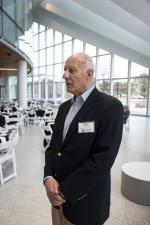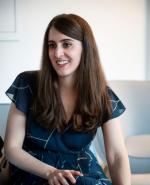Isenberg Celebrates Fifty Years of Doctoral Studies
April 17, 2019
“Doctoral programs are an investment in an academic institution and its research mission,” observed Interim Dean Tom Moliterno, at Isenberg’s 50th anniversary celebration of its PhD program April 5 in front of an audience of several generations of PhD graduates, current doctoral students, and faculty—past and present. The daylong gathering in Isenberg’s new Learning Commons attracted 260 attendees, ninety of them Isenberg doctoral graduates.
The event kicked off with a verbal tour of the program and its history by Associate Dean of Research George Milne, who directs the doctoral program. Afternoon panel discussions by academic departments followed, with current students presenting their research to alumni discussants. In the evening, the gathering heard remarks over dinner from two graduates of the program, Wheaton College President and keynoter Dennis Hanno ’90 and Vienna University of Economics and Business Professor Tina Wakolbinger ’07. The convocation also offered extended opportunities for reminiscences and networking by Isenberg’s doctoral community.
PhD Program Overview—Past and Present
In his introductory remarks, Associate Dean Milne charted the evolution of the fifty-year program. It was the first PhD program in business in the northeast, he remarked. Displaying a black-and-white photo of Isenberg’s first PhD students, Milne noted that all of the women seated in front of the nine standing male candidates were wives, not students. Today, he observed, 45 percent of the program’s 65 students are women. The same photo showed no signs of cultural diversity. Today, however, 75 percent of students have international backgrounds, he disclosed.
Still in back-to-the-future mode, the screen revealed the title of the program’s first dissertation— Individual Behavior and the Small Work Group: A Simulation Study, by Harvey Brightman ’70. Professor Brightman couldn’t make the trip from Georgia, but the program’s second graduate, Professor Al Della Bitta ’71 of the University of Rhode Island, was in the house. By the current academic year’s end, Isenberg will have graduated 450 doctoral students, added Milne. Later in his talk, the PhD director shared a bar graph listing faculty dissertation chairs next to the numbers of dissertations that they chaired. The current leader (24 dissertations) is long-retired management science professor Van Court Hare, but current professors Hossein Kazemi (Finance) and Anna Nagurney (Management Science) are on track to catch him.
At its outset, the program offered five disciplinary concentrations, Milne continued. Today, there are nine, including recent arrivals Sport Management, Hospitality and Tourism Management, and Information Science. It underscored, he said, the program’s acceptance of diverse viewpoints and its readiness to embrace new research methods.
Milne recounted some of the program’s recent innovations, including its acceleration from five to four years, summer funding for its students, their attendance at academic conferences, and Isenberg’s homegrown doctoral robing ceremony. A defining strength, he emphasized, is its renewed investment in pedagogy and teaching. That includes both in-class and on-line training. No surprise, then, to find recent graduates at Cornell, the University of North Carolina, Texas A&M, and other leading research universities.
Keynote Reflections
“Isenberg is what an academic community should be—everyone here supports each other,” observed keynote speaker Dennis Hanno. A 1990 Isenberg PhD graduate in accounting, Hanno has been president of Wheaton College since 2014. Directed by the pioneering Isenberg professor Tom Kida, Hanno’s dissertation, in behavioral accounting, subsequently won best dissertation honors in that subdiscipline from a national organization.
Writing a dissertation can be lonely and isolating, Hanno confessed. “I would go to the 12th floor of the library to write, but I always returned to Isenberg where I would recharge by interacting with peers and faculty. Isenberg is special. Through teaching as a doctoral student, you interact with undergraduates and MBAs. You learn how to learn.”
After graduating, Hanno taught briefly at Boston College before returning to Isenberg as an assistant professor. “I came back because of the people,” he told the gathering. With that advantage, “I saw the value of creating academic community. And (former Isenberg dean) Tom O’Brien was one of the most visionary leaders that I’ve worked with.”
Hanno thrived in Isenberg’s culture, eventually becoming its undergraduate dean and staying on until 2006. In that role, he encouraged Isenberg undergrads to pursue social entrepreneurship opportunities. And he amped up their exposure to multiculturalism and school-directed world travel. “Academic service and leadership provided feedback,” he recalled. “It allowed us to shape our community in our own special way.
“My PhD years were the best years in my life,” Hanno emphasized. “As a doctoral student you make a bet. Making that pivot can be scary—less so in an environment like Isenberg.”
Management Science PhD graduate Tina Wakolbinger ’07 was no less appreciative of her Isenberg years. “The PhD program truly changed my life,” recalled the Isenberg alumna, who is Professor of Supply Chain Services and Networks at the Vienna University of Economics and Business. “The multicultural backgrounds of my fellow PhD students—from China, Africa, and throughout Europe—figured greatly in my development,” she observed. “Everyone was on a different path. But everyone shared common insights and perspectives.”
The event also honored a faculty member with the new D. Anthony Butterfield Service Award for exceptional dedication to the PhD program. Its first recipient: Tony Butterfield, who energized the program in two stretches as its former director.











